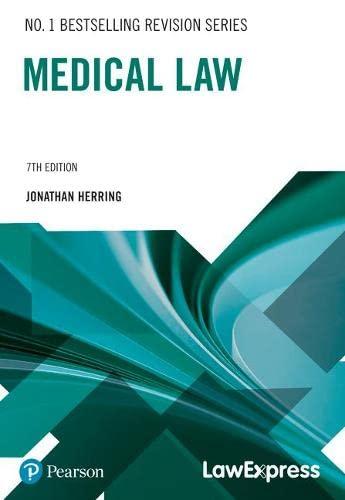Question
YCJA Principles The YCJA states that the youth criminal justice system is intended to protect the public by holding youth accountable, promoting the rehabilitation and
YCJA Principles
The YCJA states that the youth criminal justice system is intended to protect the public by holding youth accountable, promoting the rehabilitation and reintegration of youth back into society, and preventing crime.The law recognizes that youth must be held accountable, but in a way that takes into account their greater dependency and reduced level of maturity.
The YCJA states that the criminal justice system for youth must use special procedures to ensure that young people are treated fairly and that their rights are protected. It also emphasizes the importance of quick intervention to reinforce the link between the offence and its consequences.
Measures outside of formal court process
The majority of youth crimes involve non-violent activities such as shoplifting, possession of stolen property, breach of probation, or relatively minor assaults that do not involve bodily harm. Experience in Canada and other countries shows that measures outside of the formal court process can provide an effective response to youth crime and one of the key objectives of the YCJA is to encourage the use of non-court responses in appropriate cases.
These measurescan provide meaningful consequences, such as requiring the young person to repair the harm done to the victim. They also allow early intervention with young people and provide an opportunity for the broader community to play an important role in developing community-based responses to youth crime.
Sanctions, such as volunteer work, compensating (or paying back) the victim, or attending a specialized program, can be used where the young person takes responsibility for the offence. If the young person fails to comply with the terms and conditions of the sanction, the case may proceed through the court process.
Youth Court
If a young person's case is not resolved outside of court, it will be dealt with in youth court. When a young person is charged with an offence, he or she may remain in the community or, if the court deems it necessary, be kept in custody until the trial takes place. Being held in custody while awaiting trial is known as pre-trial detention.
Sentencing
If a youth pleads guilty or is found guilty of a criminal offence, the youth court judge must determine the appropriate sentence. The purpose ofyouth sentencesis to hold the young person accountable with meaningful consequences that promote rehabilitation and reintegration. The YCJA provides youth court judges with many different sentencing options to deal with the full range of youth crime. These include both community-based sentences -- where the youth serves his or her sentence in the community, often under strict conditions -- and custody sentences, which include both a period of time in a youth custody facility and a period of community supervision. The maximum length of youth sentences ranges from two to ten years, depending on the offence committed and the type of sentence imposed.
While in most cases judges impose one of the youth sentencing options in the YCJA, the Act does allow judges to impose an adult sentence on a youth who is found guilty of a serious offence and was 14 years of age or older when the crime was committed. In fact, prosecutors are obligated to consider seeking an adult sentence when a youth is found guilty of murder, attempted murder, manslaughter or aggravated sexual assault. However, the Act allows provinces to raise the age at which this obligation applies to 15 or 16.
When a judge decides to impose an adult sentence, theCriminal Codepenalties for adult offenders are applied to the youth. This can include mandatory minimum penalties and sentences of up to life imprisonment. However, no portion of either an adult or a youth sentence can be served in an adult prison while the youth is still under the age of 18.
Reintegration
The YCJA recognizes that young people coming out of custody will need assistance in successfully reintegrating into the community. Therefore, every period of custody is followed by a period of supervision and support in the community as part of the young person's sentence. A youth worker helps the young person plan for his or her reintegration into the community and provides support and supervision to help ensure a successful transition back into society.
What is the five main point of this?
Step by Step Solution
There are 3 Steps involved in it
Step: 1

Get Instant Access to Expert-Tailored Solutions
See step-by-step solutions with expert insights and AI powered tools for academic success
Step: 2

Step: 3

Ace Your Homework with AI
Get the answers you need in no time with our AI-driven, step-by-step assistance
Get Started


